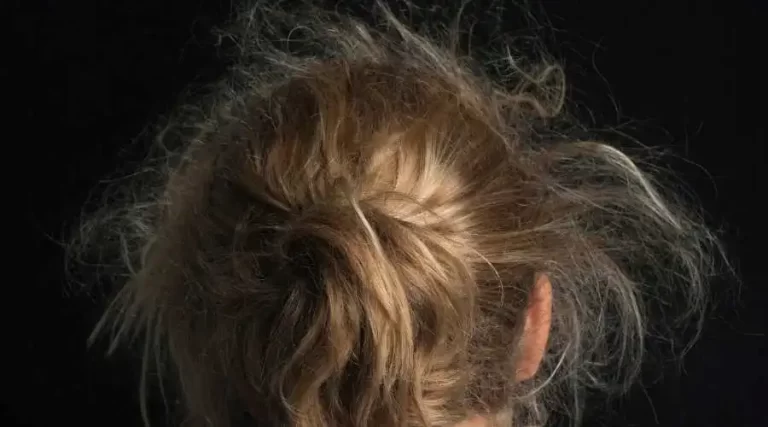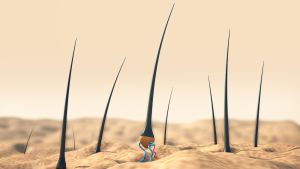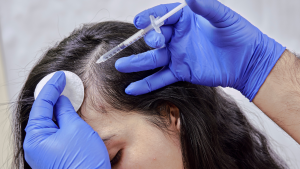Hair loss can be a frustrating, and sometimes embarrassing problem that many of us face. Whether you’re a man or a woman, hair loss can happen to anyone. It’s more common than you might think, affecting nearly half of all men and up to 50% of women at some point in their lives. But don’t worry, you’re not alone, and there are ways to understand why it’s happening and what you can do about it. In this article, we’ll simplify the complex world of hair loss, explain why it occurs, and guide you through potential solutions.
Why Does Hair Decide to Leave?
Hair loss doesn’t pick favorites based on gender or age. It’s an equal-opportunity issue. The main culprit behind this is something called “androgenetic alopecia” or hereditary hair loss. It’s in your genes, and it doesn’t matter whether it’s from your mom or dad’s side.
For women, it often shows up as your hair getting thinner all over or your part suddenly looking wider. Men might notice their hairline retreating or a bald spot appearing on top.
So, why does this happen? Blame it on your hair’s growth cycle. In androgenetic alopecia, the hair’s growing phase (anagen) gets shorter over time. This means your hair gets thinner, falls out, and doesn’t grow back as it should.
This hair loss can start any time after puberty, but it’s usually more noticeable around menopause for women. High levels of certain hormones, like testosterone, can also pitch in and speed up hair loss.
What’s Behind Hair Loss?
Now that we’ve got the basics down, let’s dig into what might be causing your hair to bid farewell:
- Hypothyroidism: When your thyroid, a tiny gland in your neck, isn’t working properly, it can lead to hair loss.
- Low Iron Levels: Not having enough iron in your blood can make your hair fall out.
- Tight Hairstyles: Those super tight ponytails or heavy extensions you love? They can damage your hair follicles, causing permanent hair loss.
- Stress: Whether it’s from a tough workout or emotional strain, stress can shove your hair from the growing phase to the resting phase, making it more likely to fall out.
- Alopecia Areata: Sometimes, your immune system goes rogue and attacks your hair follicles, causing hair loss.
- Inflammation: Conditions like psoriasis can irritate your scalp and lead to hair loss.
- Infections: Fungal infections can also mess with your hair.
- Trichotillomania: If you have a habit of pulling out your own hair, especially when you’re stressed, that can lead to hair loss too.
- Medications: Some drugs, especially those used for chemotherapy, can cause your hair to fall out.
Lifestyle Factors and Hair Loss
Your daily life can play a big role in your hair’s health too. Here are a few lifestyle factors that might be contributing to your hair loss:
- Stress: If you’re constantly stressed, it can lead to inflammation, and that’s bad news for your hair. Stress can also shift your hair into the resting phase, making it more prone to falling out.
- Diet: What you eat matters, and not just for your waistline. If you’re not getting the right vitamins, minerals, protein, and other nutrients, your hair can suffer. Iron deficiency is a common cause of hair loss, especially in women.
- Rapid Weight Loss: Shedding pounds too quickly, like dropping 15 to 20 pounds in no time, can contribute to hair loss. It’s essential to aim for a steady and healthy weight loss journey.
Hormone Disorders and Hair Loss
Hormones are like the conductors of your body’s orchestra, and when they’re out of sync, hair loss can be the result. Let’s look at two hormone-related conditions that can affect your hair:
- Thyroid Issues: Your thyroid hormone is essential for your hair follicles’ health. Both too much and too little of this hormone can lead to hair loss. The good news is that thyroid-related hair loss is usually temporary with proper treatment.
- PCOS (Polycystic Ovary Syndrome): This common hormone disorder primarily affects women. It’s known for causing excess facial and body hair, but it can also mess with the hair on your head. PCOS revs up androgen activity, which can trigger female pattern hair loss. The good news here is that medications like spironolactone and oral contraceptives can help.
What to Do When Hair Loss Strikes
If you’ve noticed your hair is saying goodbye more often than you’d like, don’t panic. There are steps you can take to tackle the issue. Here’s your action plan:
Consult a Doctor
The first and most crucial step is to see a doctor. They’ll look at your family history, check for signs of inflammation or infection, and maybe even order some blood tests to pinpoint potential causes like thyroid problems or iron deficiency.
Early Action
The sooner you tackle hair loss, the better your chances of success. Don’t wait; address it as soon as you notice it.
Diagnosis
Your doctor might perform a scalp biopsy, especially if they suspect scarring alopecia. This helps pinpoint the exact cause of your hair loss.
Treatment Options
Your treatment plan depends on what’s causing your hair to thin out. Here are some options:
- Minoxidil: This topical treatment can help women with female pattern hair loss. You need to use it consistently to see results.
- Laser Therapy: Low-level laser therapy can stimulate your hair follicles. Combining it with derma-rolling and serums might speed up regrowth.
- Hair Transplant: For folks with significant hair loss, there’s hair transplant surgery. Keep in mind that it’s on the pricier side.
- Platelet-Rich Plasma (PRP) Injections: This in-office treatment uses your blood’s platelets to give your hair follicles a boost. It’s a natural approach and has shown promise.
- Medications: For men with male pattern hair loss, medications like finasteride and dutasteride are FDA-approved. Women dealing with female pattern hair loss might consider spironolactone.
- Supplements: If you’re low on certain nutrients, supplements like biotin, iron, protein, and zinc can help.
Combination Therapy
Often, using a combination of treatments works best. It can lead to new hair growth, make existing hair thicker, and reduce hair loss.
Can Supplements Really Help?
Supplements can be useful, but they’re not a universal fix. Here’s a quick rundown:
- Iron Supplements: These can help if you’re iron deficient.
- Oral Anti-Androgens: Medications like finasteride, dutasteride, and spironolactone are effective for androgenic alopecia.
- Biotin and Saw Palmetto: Look for supplements with at least 250 mcg of biotin and saw palmetto. They might help block the hormone DHT, linked to hair loss.
- Nutrafol: This special product contains biotin, saw palmetto, and other plant-based ingredients with anti-inflammatory and DHT-blocking properties.
Natural Tips for Hair Health
While there’s no magic potion for hair regrowth, there are some natural ways to keep your hair healthy:
- Gentle Hair Care: Use shampoos and conditioners that are sulfate-free to avoid damaging your hair.
- Limit Heat and Chemicals: Excessive heat and chemical treatments can harm your hair. So, go easy on the hot styling tools and consider professional care for chemical treatments.
- Loose Hairstyles: Constantly pulling your hair into tight styles can lead to hair loss over time. Opt for looser hairstyles whenever you can.
- Kick the Habit: Smoking causes inflammation throughout your body, including your hair follicles. If you’re a smoker, quitting could benefit your hair health.
- Eat Healthy Foods: A balanced diet rich in vitamins and minerals is crucial for vibrant hair. Incorporate foods like leafy greens, nuts, and eggs, which are packed with nutrients essential for hair strength and growth.
Hair loss can be a challenging issue to face, but you’re not alone in this journey. Understanding why it’s happening and taking proactive steps can make all the difference. Remember, the sooner you address hair loss, the better your chances of regaining healthy, vibrant locks. So, don’t hesitate – consult a doctor, explore your treatment options, and take charge of your hair and your confidence.
If you suspect you’re experiencing hair loss, the first and most crucial step is to see a medical professional, such as those from Lasting Impression Medical Aesthetics. They can help you identify the underlying cause and recommend a suitable treatment plan. Remember, early intervention often leads to better results.
Your hair plays a significant role in your overall confidence and self-esteem. Don’t let hair loss hold you back. Take action, seek help, and look forward to a future with a full head of healthy, beautiful hair.





